And to top it off: cancellations of pending sales rose to a record rate in July.
By Wolf Richter for WOLF STREET.
Demand in the housing market sagged further: Pending home sales dropped by 0.4% in July from June, seasonally adjusted. They have now spent nearly three years crawling along, or setting, record lows, according to data going back to 2010 from the National Association of Realtors today (historic data in the chart via YCharts):
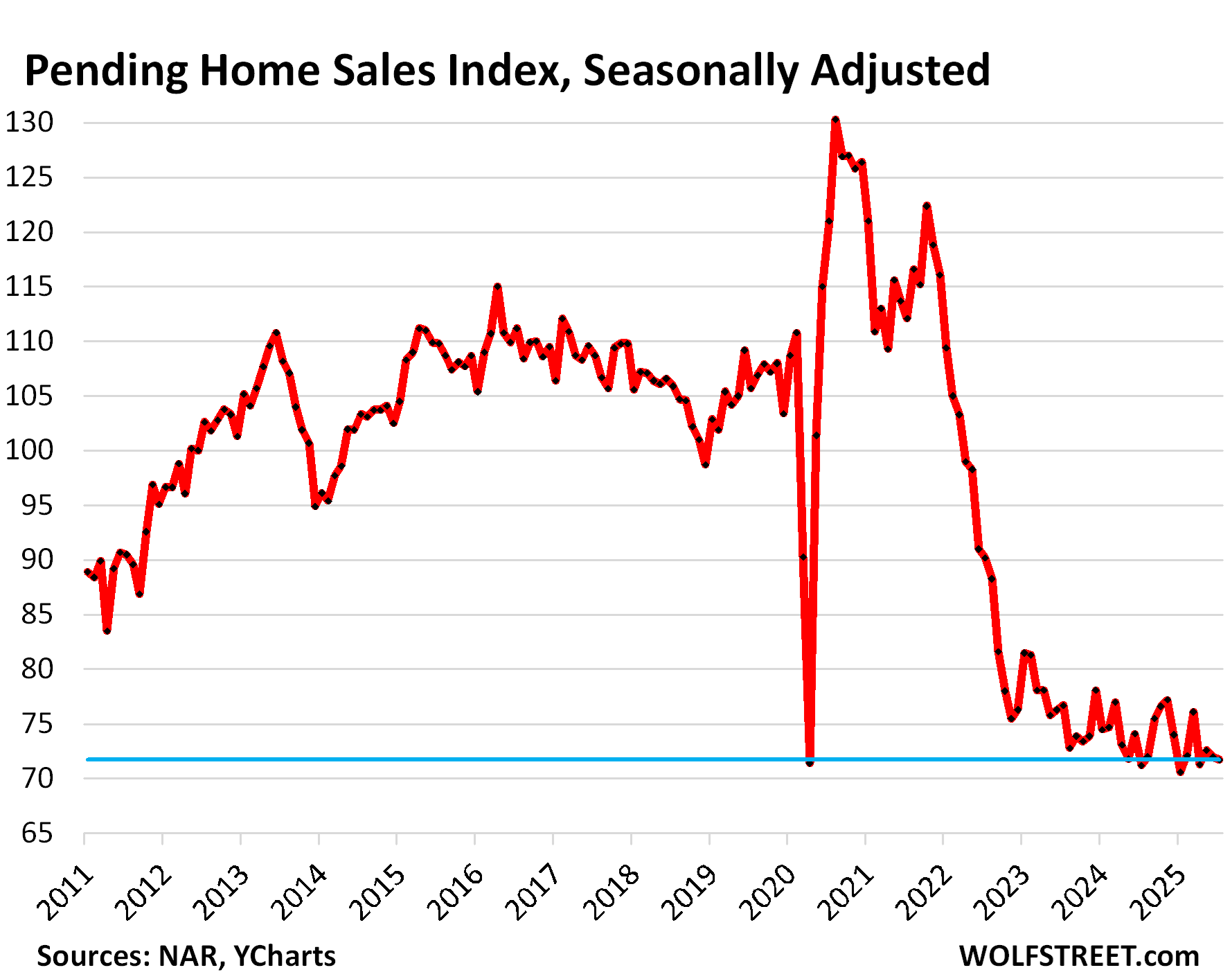
It’s even worse: the cancellation rate. Pending sales are based on contract signings and track deals that haven’t closed yet and could still get canceled because buyers cannot afford or even get homeowner’s insurance, or for other reasons. Signed contracts that then get cancelled are included in the pending sales here, but are not included in closed sales reported later.
Alas, Redfin reported that in July, 58,000 pending sales were canceled, amounting to 15.3% of all pending sales, the highest rate for any July in Redfin’s data going back to 2017
Pending sales in all regions near record lows. Pending sales fell sharply in the Midwest, but also declined in the South and Northeast. The West was the only region where pending sales rose. Pending sales remained near record lows in all four regions.
Pending sales of existing homes in the US, compared to the Julys in prior years:
- 2024: +0.7%
- 2023: -6.5%
- 2022: -21%
- 2021: -36%
- 2020: -41%
- 2019: -32%.
The Buyers’ Strike continues because prices are too high after shooting up by 50% or more within 2-3 years. Those prices no longer make economic sense.
While inventory surged. This plunge in demand coincides with surging inventories of existing homes for sale – despite large waves of delistings by frustrated sellers – leading to the most supply since July 2016 over the past three months, along with May 2020.
Split out by single-family homes and condos: Supply of single family homes rose to 4.5 months while supply of condos has been over 6 months since April, the highest since 2012 at the end of the Housing Bust. Here is the combined supply:
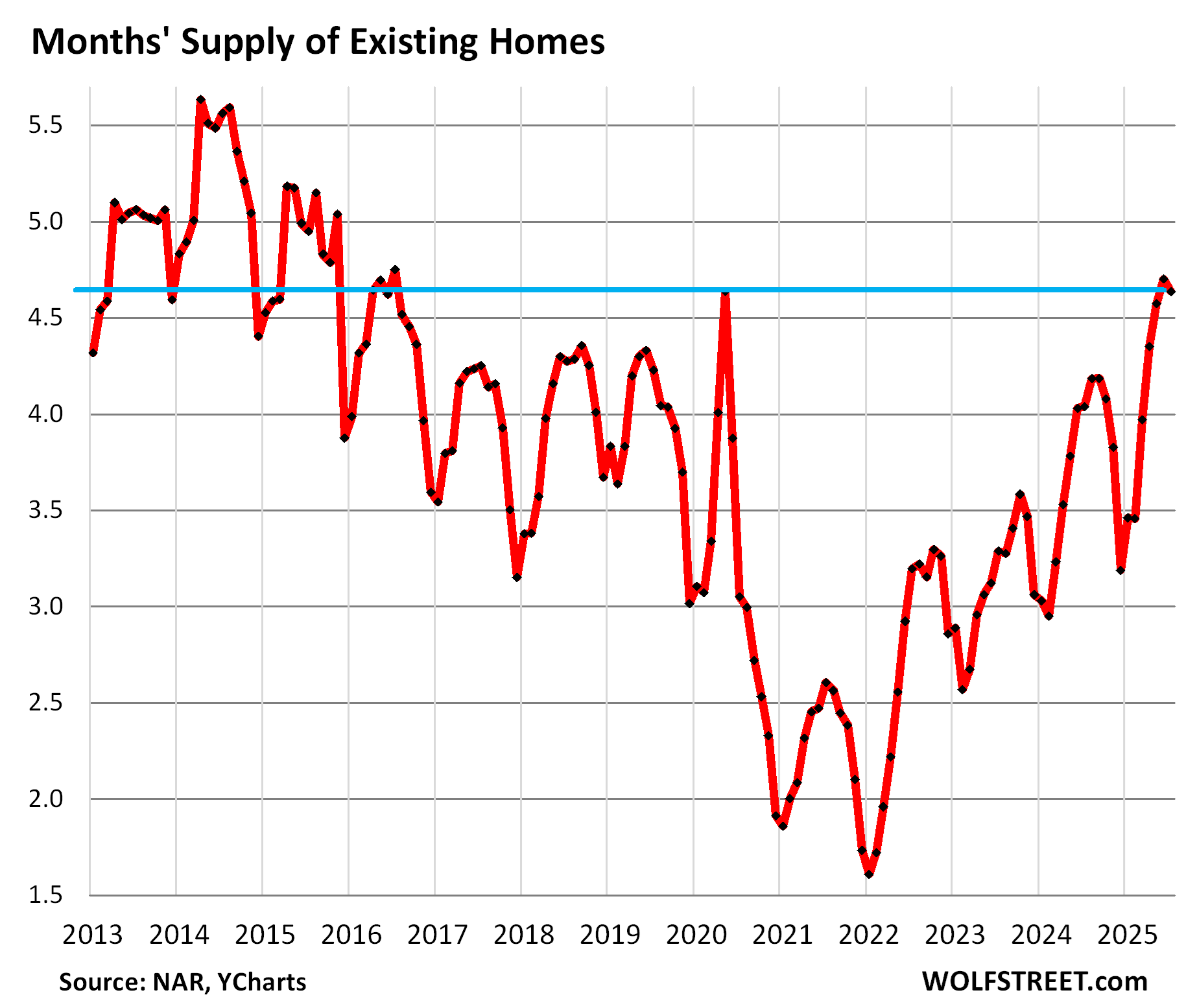
In the South, pending sales dipped 0.1% month-to-month, seasonally adjusted.
A map of the four Census Regions is posted in the comments below.
Compared to the Julys of prior years:
- 2024: +1.8%
- 2023: -9%
- 2020: -39%
- 2019: -30%
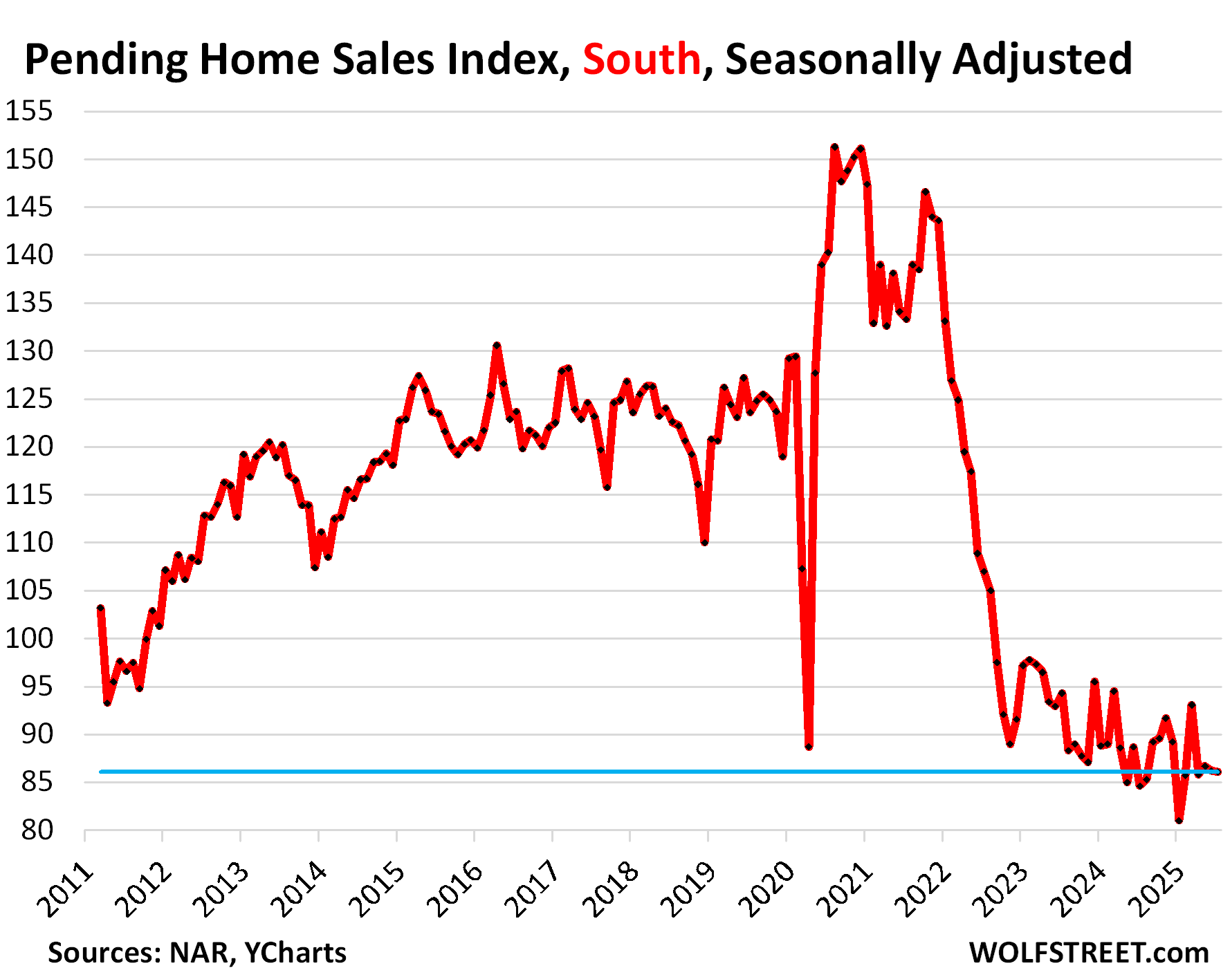
But inventories surged across the South.
In Texas, inventory of existing homes for sale in July jumped by 24% year-over-year, and by 32% from July 2019, to the highest in at least the decade of data from Realtor.com (we discussed the inventories of the big metros in Texas here).
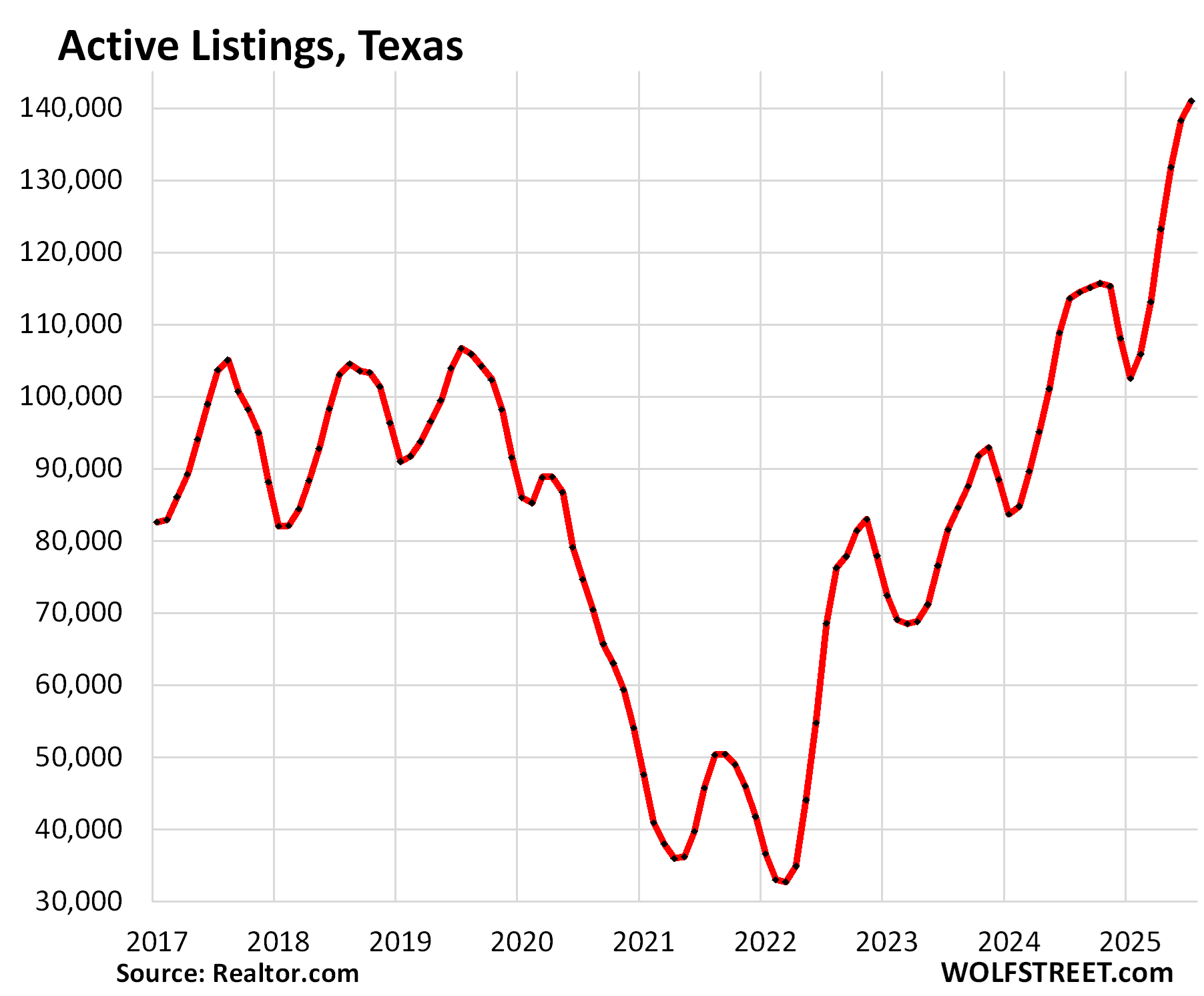
In Florida, active listings in July jumped by 23% year-over-year, and by 29% from July 2019, according to data from Realtor.com (we discussed Florida’s by-metro inventories and days on the market here):
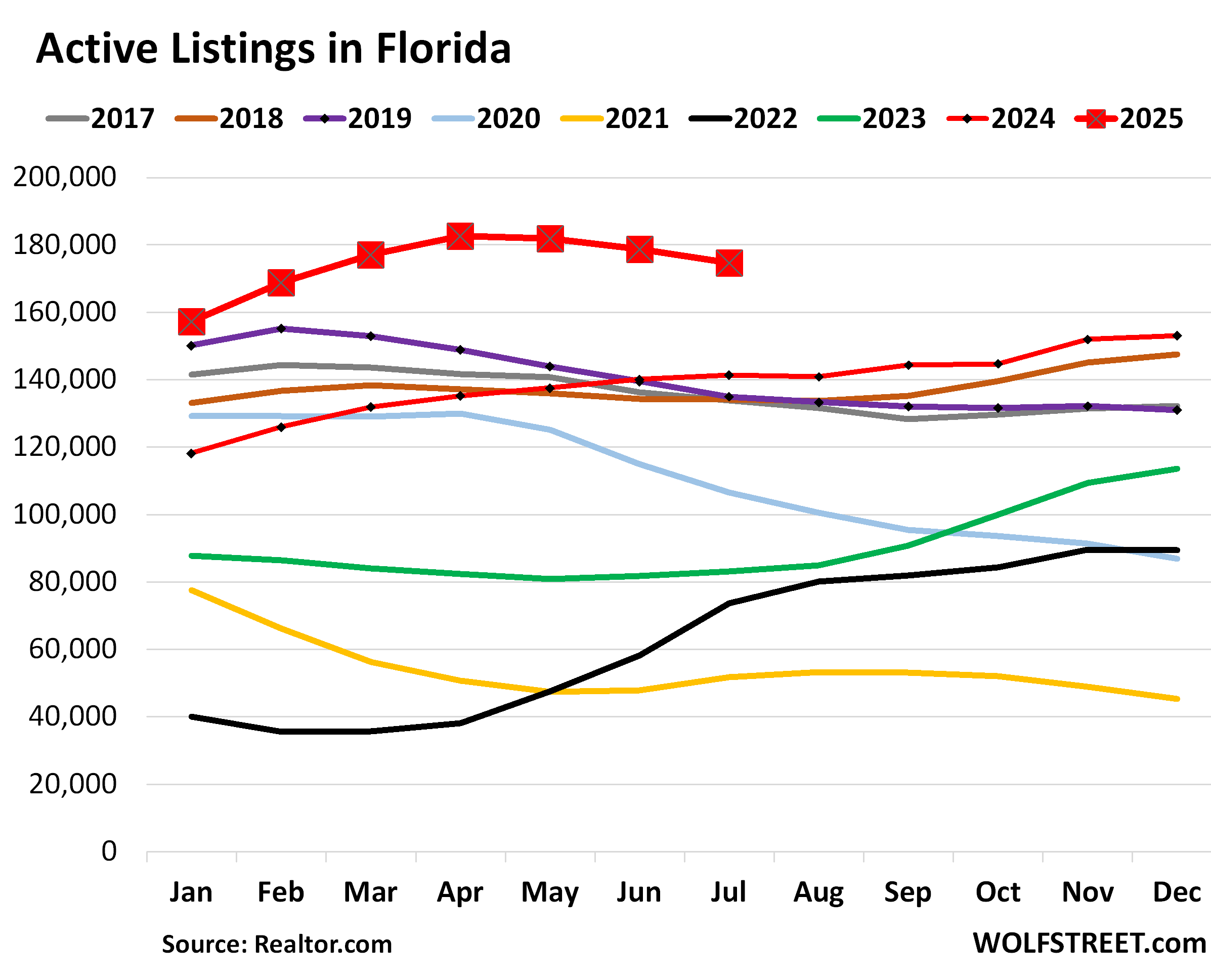
And for example, in the Atlanta metropolitan area, active listings spiked by 31% year-over-year in July:
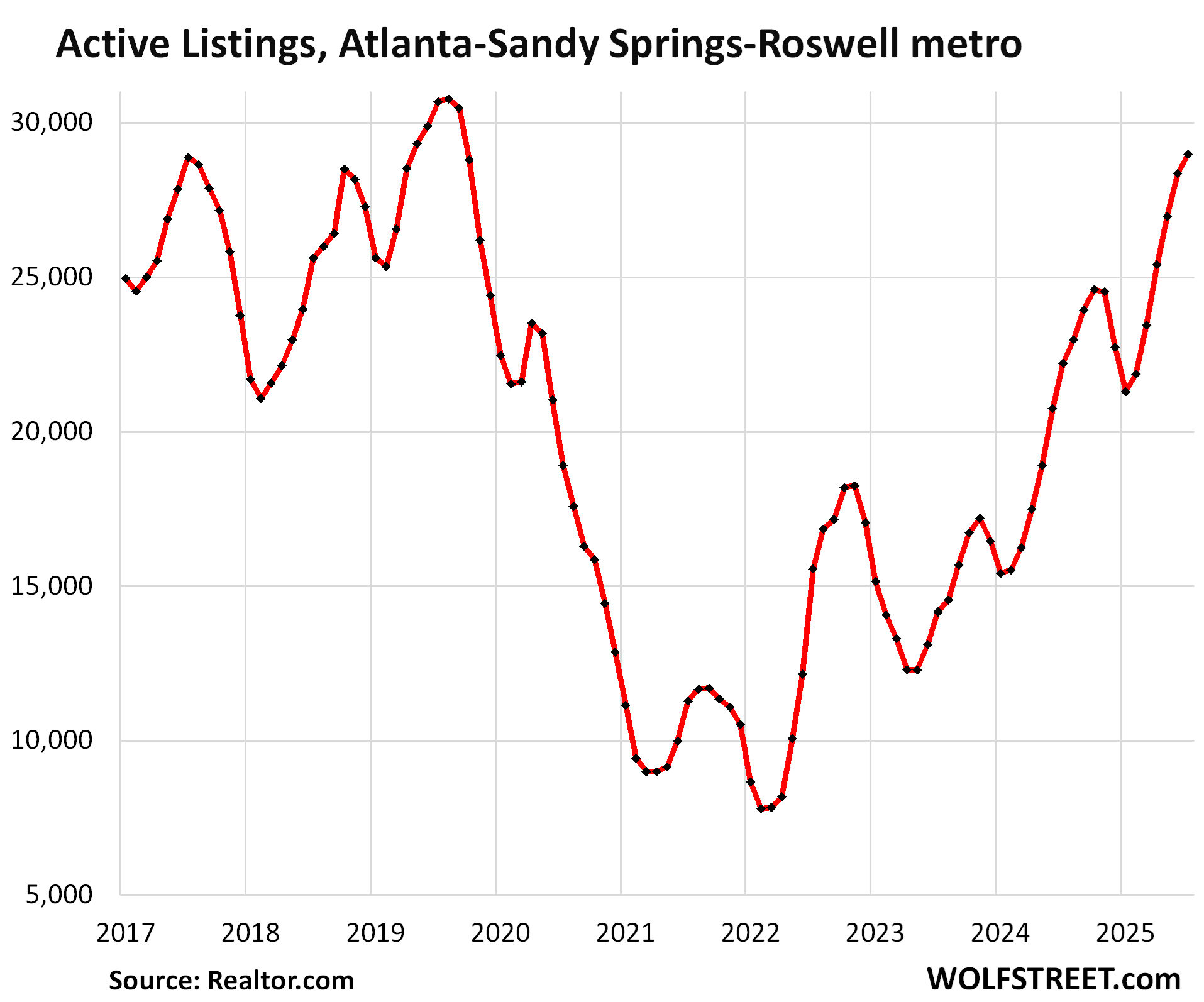
In the West, pending sales rose by 3.7% in July from June, which had been the second-lowest on record.
Compared to the Julys of prior years:
- 2024: -1.9%
- 2023: -6%
- 2020: -47%
- 2019: -40%
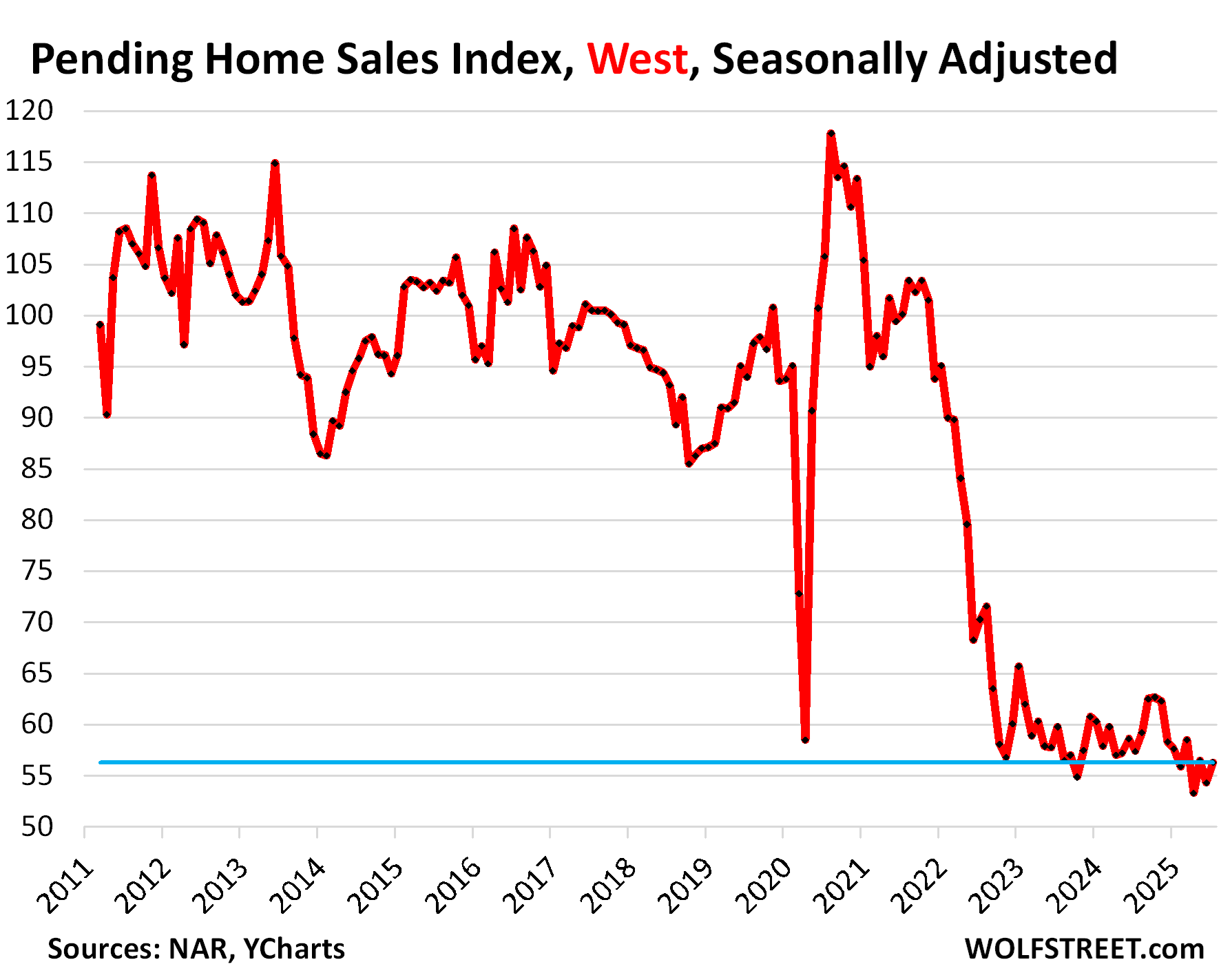
Active listings in the West have also been surging.
In Los Angeles County and in the San Francisco metropolitan area, active listings reached the highest level for any July in the decade of data from Realtor.com (discussion of inventories of in biggest markets of California is here).
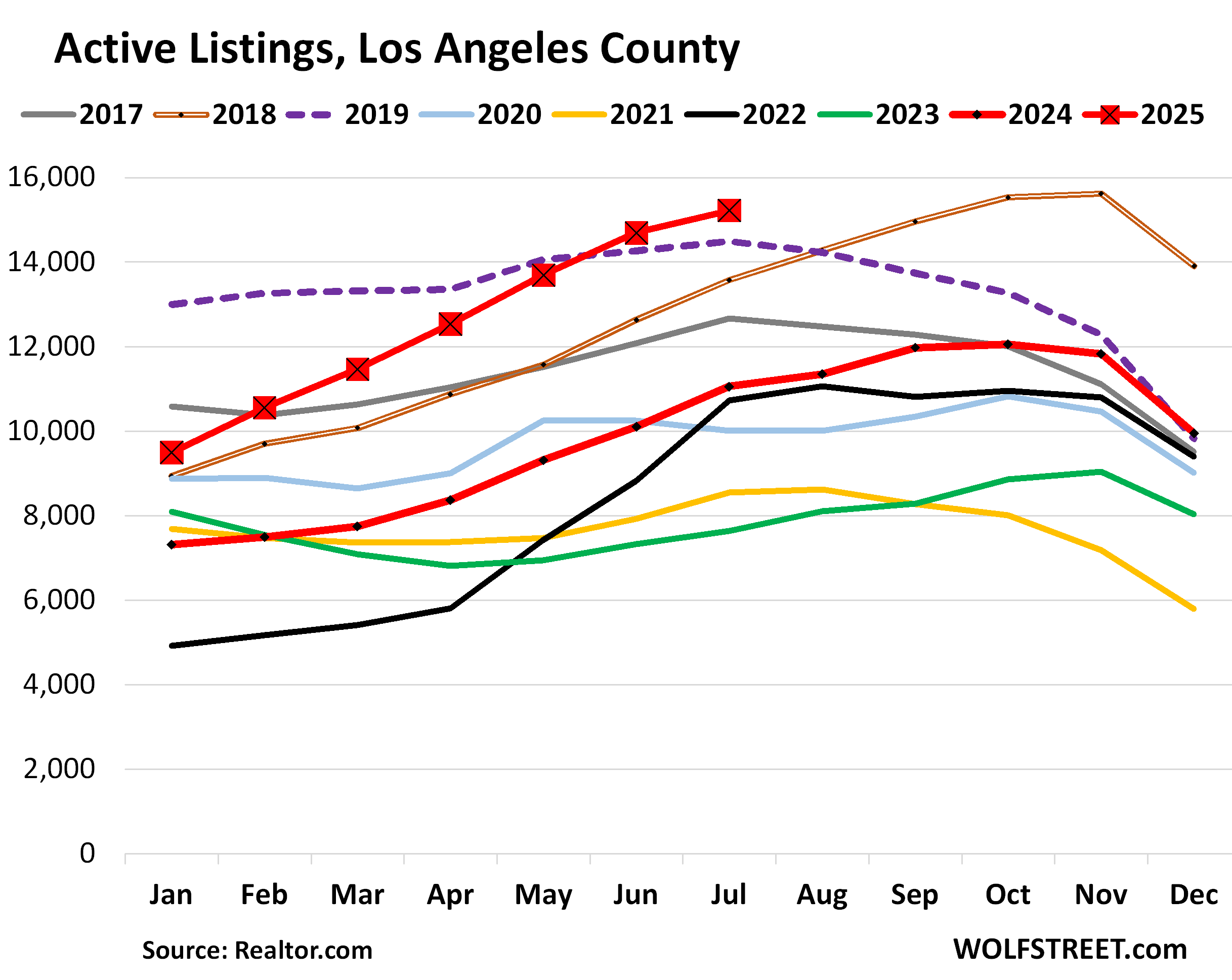
In other markets in the West, inventories have also surged, reaching the highest for any July in the decade of data in the metros of Denver, Seattle, Salt Lake City, Phoenix, Tucson, Portland, and Las Vegas (discussion by metro here).
For example, active listings in the Denver-Aurora-Centennial metro are up by 48% from July 2019 (dotted purple), and along with June the most in the decade of data from Realtor.com.
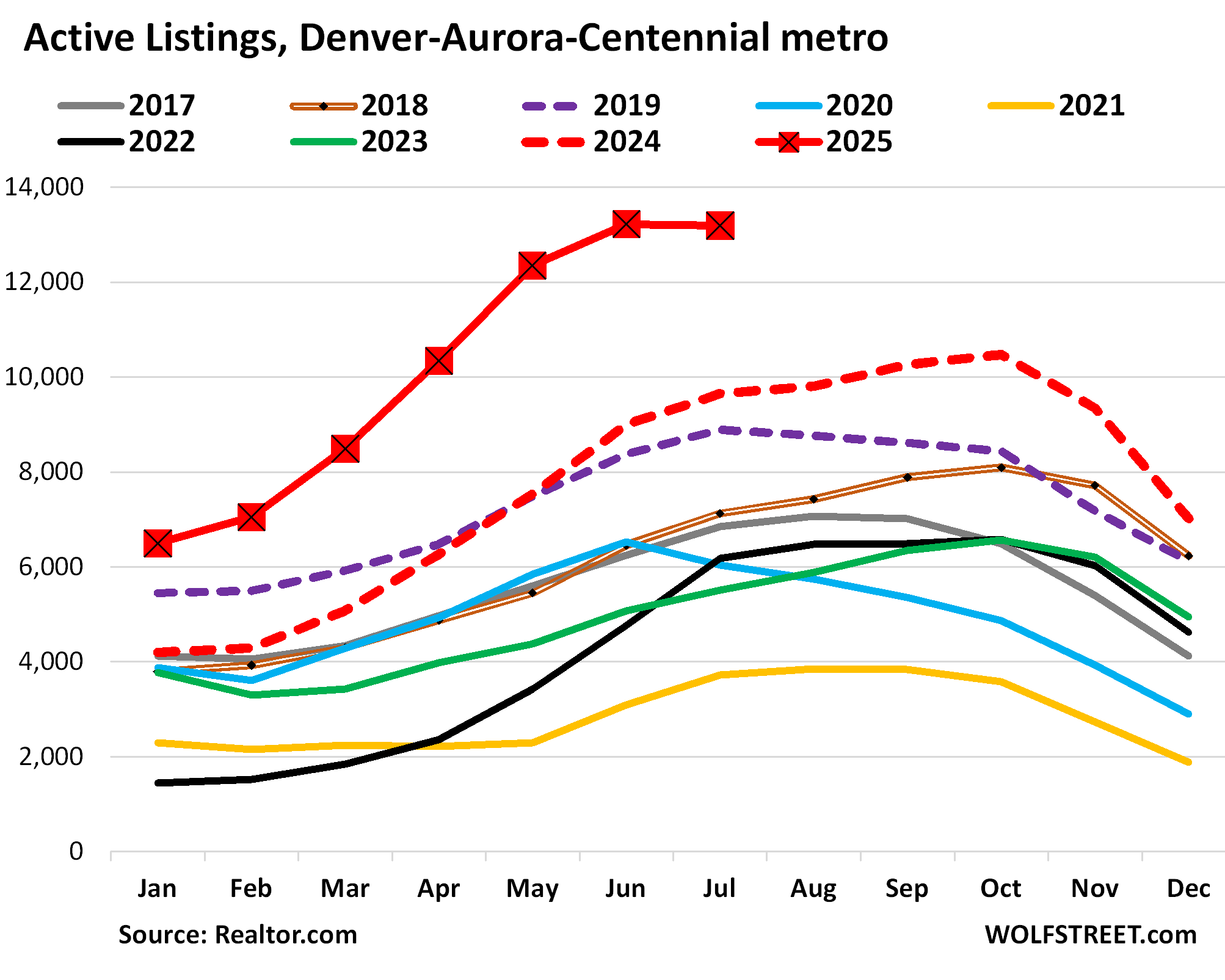
In the Northeast, pending sales dipped by 0.6% month-to-month, seasonally adjusted.
Compared to the Julys of prior years:
- 2024: -0.6%
- 2023: -2%
- 2020: -42%
- 2019: -31%
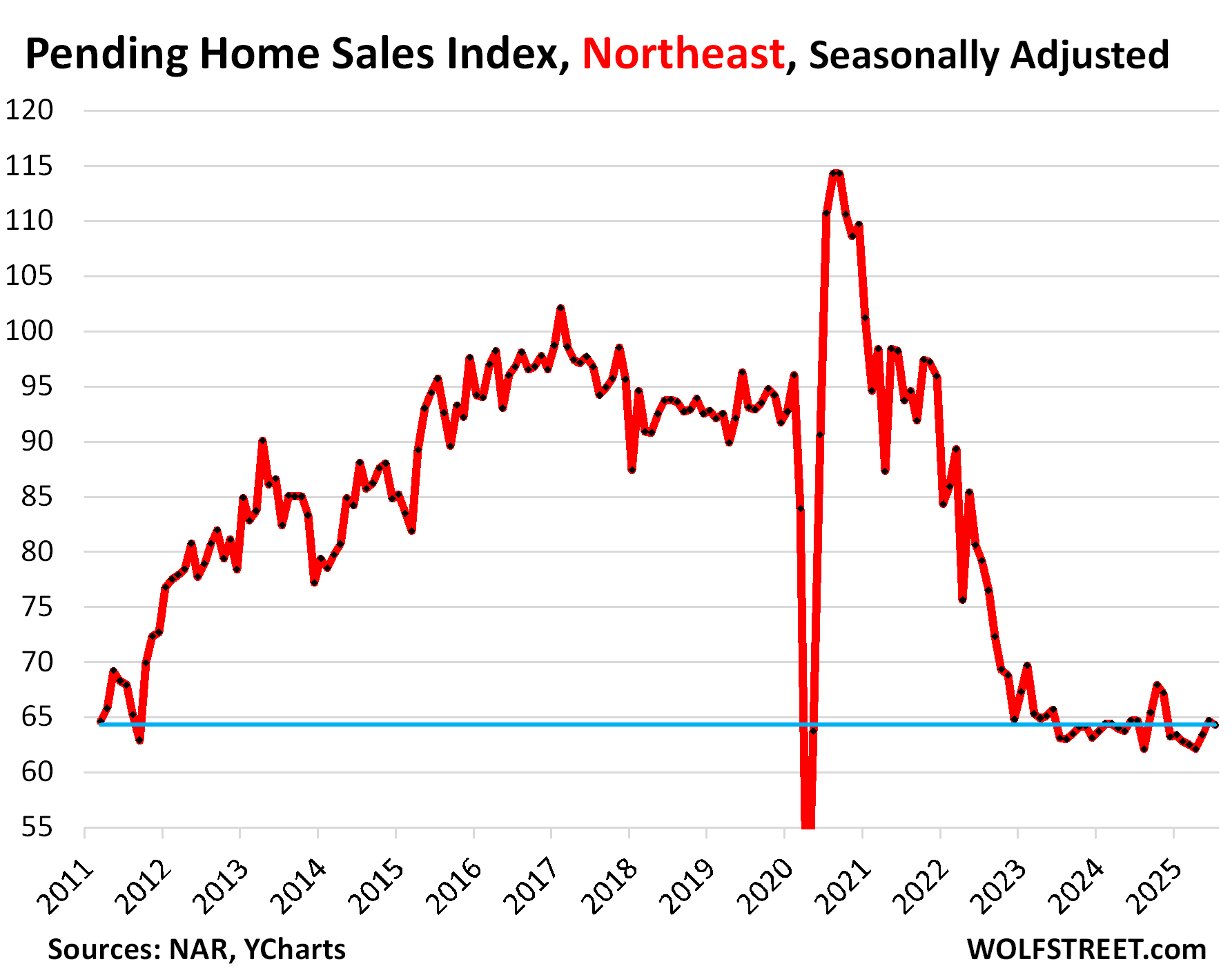
In the Northeast, inventories have also grown, but remain tighter than in other parts of the US.
For example, in the Boston-Cambridge-Newton metro, inventory jumped by 25% year-over-year and by 61% from July 2023, to be roughly level with July 2020, but well below the prepandemic years.
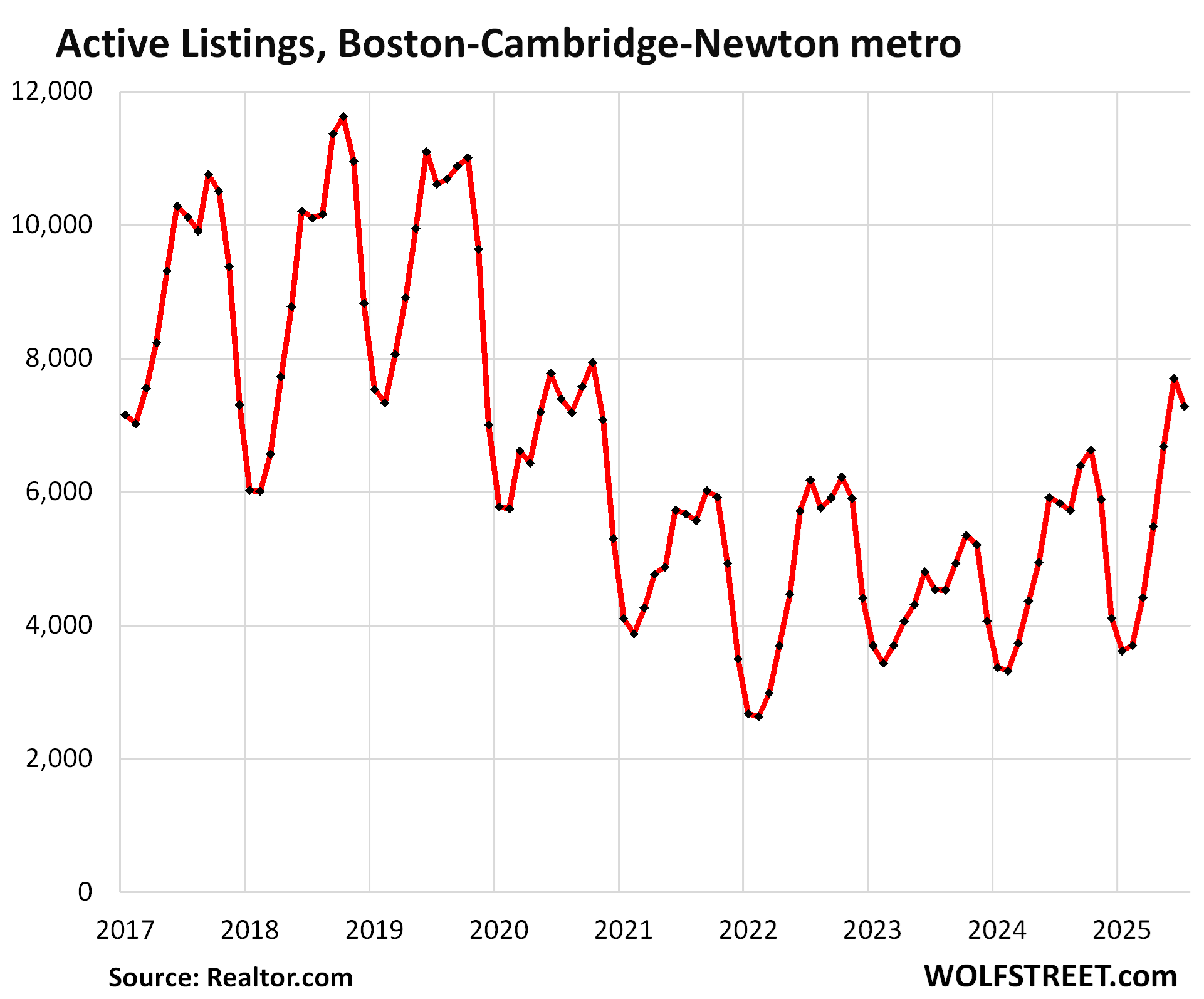
In the Midwest, pending sales dropped by 4.0% in July from June, seasonally adjusted, to the second-lowest sales in the data going back to 2010.
The record low had been July 2024, and compared to this record low, sales were 1.3% higher.
Compared to the Julys of prior years:
- 2024: +1.3%
- 2023: -8%
- 2020: -39%
- 2019: -29%
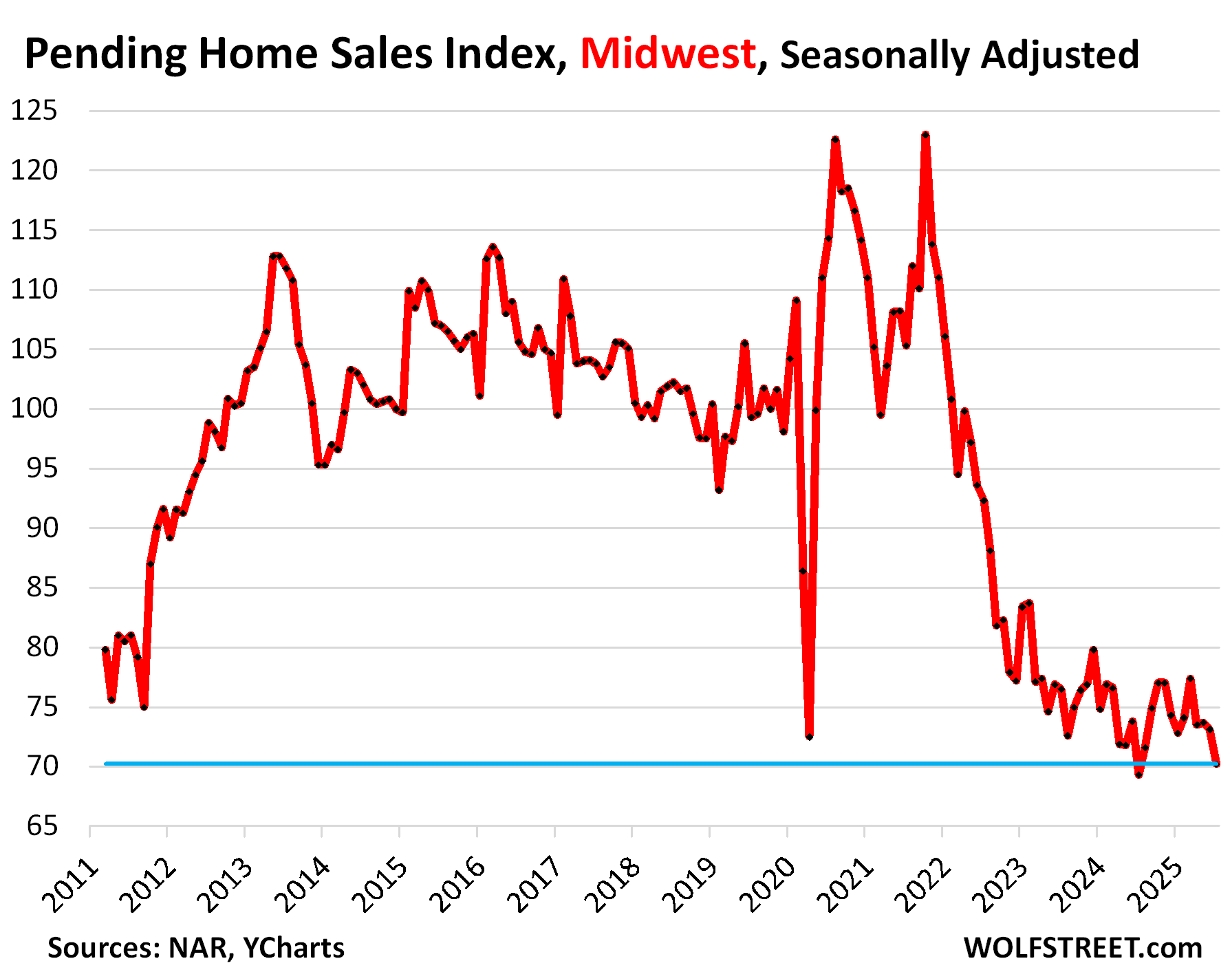
Inventories in some of the big metros in the Midwest diverge, rising sharply in some, such as in the metro of Columbus, OH, but less so in the metros of Detroit and Chicago:
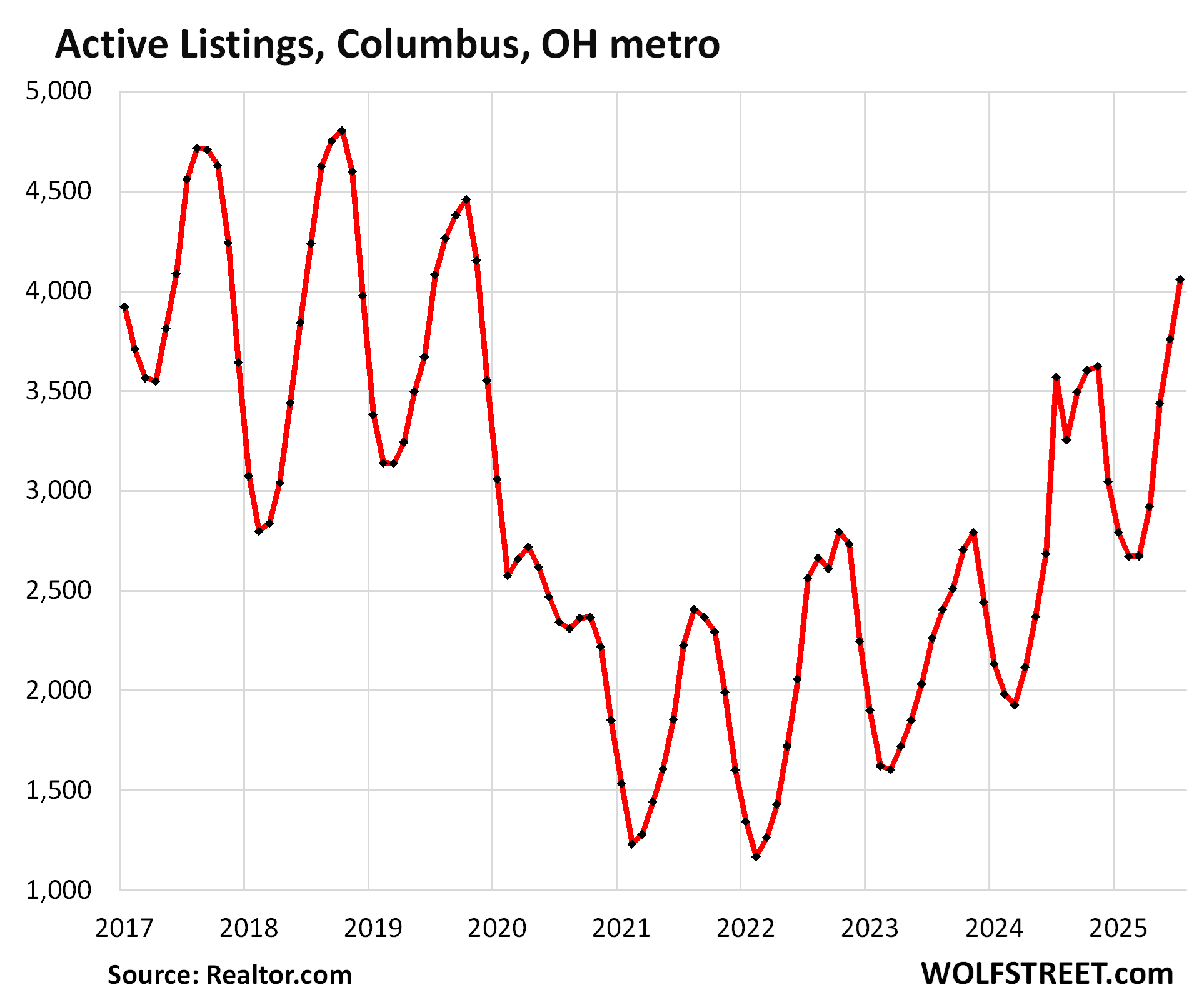
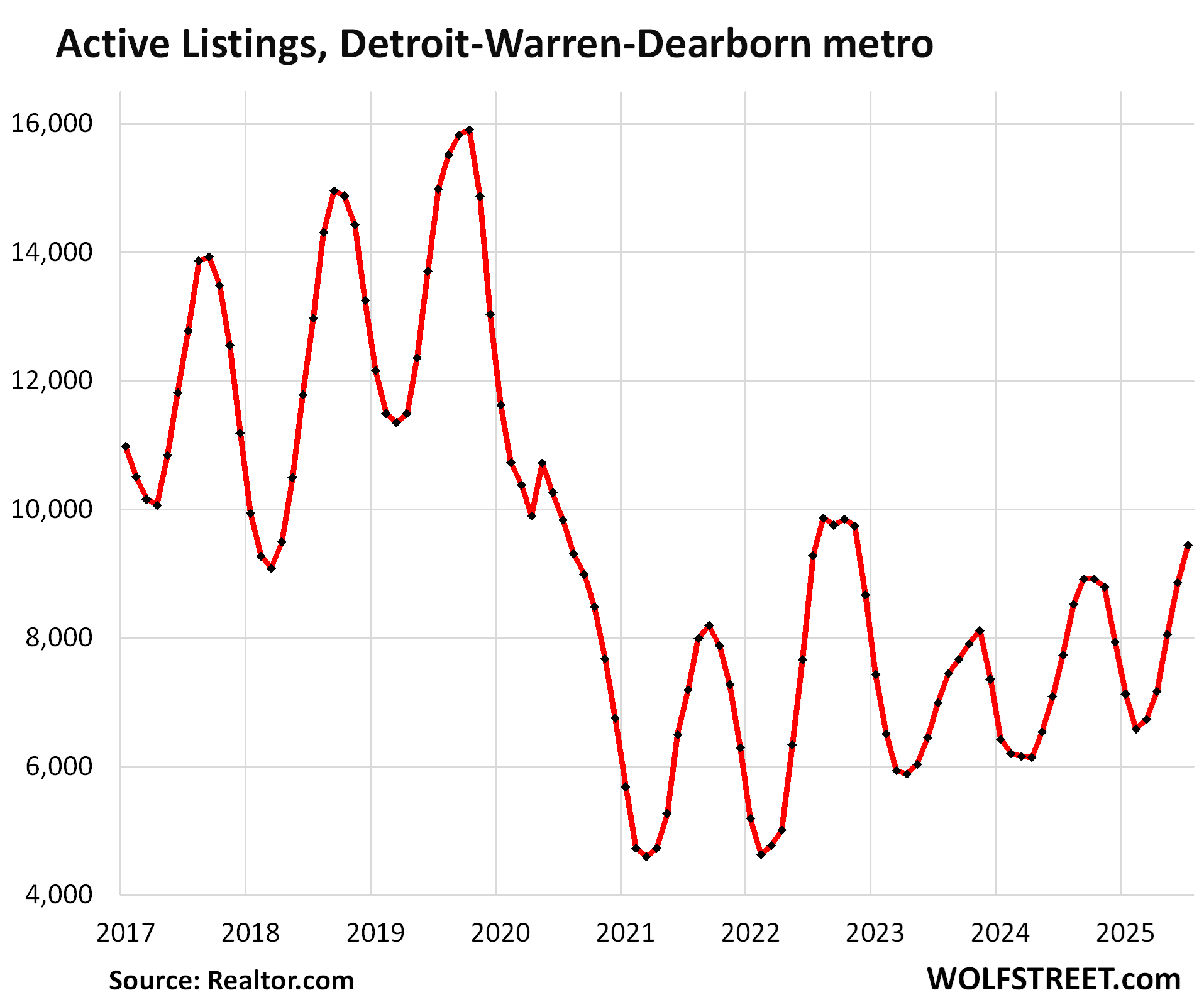
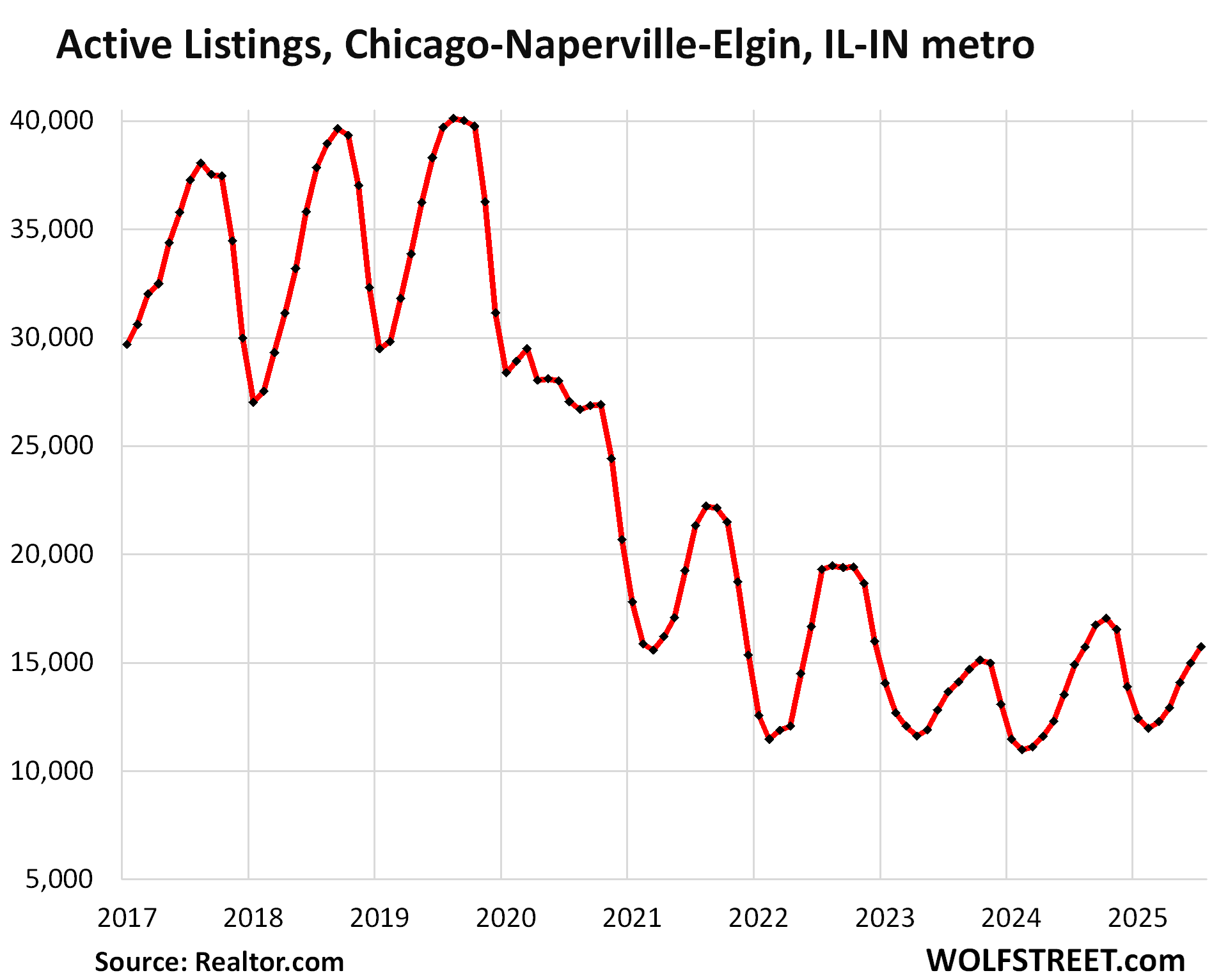
Enjoy reading WOLF STREET and want to support it? You can donate. I appreciate it immensely. Click on the mug to find out how:
![]()


The four Census Regions of the US:
Thank You for the report W.R. 🍻
Realtors must be dining on rat kabobs at this point.
Depth Charge,
Sold a house FSBO a few months ago and the buyer brought a realtor into the equation… what a sleazy, lying, crook. Got the deal done in spite of his incompetence. I enjoy the idea of him eating rat kabobs, which would be a form of cannibalism.
Tom
Perfect comment!!;!;
I like to think of them rocking back and forth on the floor, chanting “date the rate….date the rate…. date the rate”
In previous housing bubbles, many owners were forced to sell, which started a snowball effect of further lowering prices, more forced sales and foreclosures etc. This appears to be a unique situation where most sellers just pull their homes from the market. So apparently they can afford the carrying cost of an empty home or losing rental. The number of forced sellers appears to be insignificant. Buyer want a bees are seeing lower rents and smell a bubble so they are chilling until prices drop. Sellers saying I’ll just keep the place. We’ll see who blinks first, but this can apparently go on a long time since neither side is in a forced to act position.
“We’ll see who blinks first, but this can apparently go on a long time since neither side is in a forced to act position.”
Deaths, divorce, job relocation, kids. Life happens, albeit slowly.
The interest rate is what determines the market in real estate handstone there is no other common denominator more important than that yet The Fed continues to hold the rate up For no reason other than political this is regional ridiculous the rate should be at 5% for the average mortgage right now not 7 1/2
I’d love to hear the analysis behind the comment.
Lol, inflation is still raging and I wouldn’t expect to see 5% rates anytime soon. If Trump manages to force down short term rates there will be a rebellion in long term lending and he will eventually wish he hadn’t.
MLB – “The interest rate is what determines the market in real estate handstone there is no other common denominator more important than that…”
Absent interventions, the market consists of rational buyers and sellers. Ultra-low rates lead to manias and asset bubbles. Just like for autos, shelter-buyers look at the monthly payment for affordability. The monthly nut matters most. Price is important for both shelter-buyers and investors. Price should include carrying costs, which just went up a lot along with price.
The current “market” is distorted due to interventions. Sub-3% pandemic mortgage rates via Fed MBS purch., etc., drove up house prices. Rates are now over 2x that at 6.5% (MND) for 30 yr. fixed-rate. For the same monthly payment as pandemic rates, prices need to drop by about 40%.
I think that lower rates would support elevated prices; that’s how we got here, by artificially low rates. I also don’t think that we’ll see sub-6% rates anytime soon due to fiscal dominance and reckless federal spending. The Fed can cut (short-term) FFR, but as we saw last Sept., the long bond went up. The Fed doesn’t control long-term rates.
Let the FED cut and watch long term rates go up.
How is the Fed holding the mortgage rate up? Do you want them to “buy” more mortgage backed securities by doing more money printing dollar devaluation? The Fed still holds 2 trillion in MBS and it shouldn’t hold any so this actually is still suppressing mortgage rates because if they got rid of their huge amount of MBS they would have to compete with all the rest. I don’t know how much MBS are in the market. Saw one figure of 9.5. If so a 20% increase in supply would make a difference, yields would probably have to rise to attract sufficient amount of buyers.
I disagree. Interest rates are a factor, but not the determinate and certainly not the most important denominator.
For people who can’t pay cash for a house, the #1 factor is debt-to-income ratio. The interest rate is just one minor component of that. It’s the gold standard that every bank uses to determine whether or not you qualify.
People tend to buy as much house as they can afford the monthly payment on, and in my experience they want 40% DTI or less.
Pre-pandemic – 6% interest rate, without taxes/insurance/etc. At 40% DTI, a buyer would pay roughly $600 per $100k on a 30 year mortgage.
Pandemic drops – At a 2.5% rate, that’s $400 per $100k – a 33% increase in buying power. People could get $133k (or more) at the same monthly payment. They have to make $1k per month salary for every $100k they borrow.
So, sale prices jumped by 30-40%, and buyers thought “no sweat, same payment for me.”
Post pandemic – Interest rates go back to 6% (or higher) – That $133k on the exact same house, payment is now $800 per month, which is twice what it was a few years ago.
But, the previous hot market set unrealistic price growth expectations. So people are expecting to sell for more than they paid, they add 30-40% to what they paid. That $133k + 33% = $177k. Monthly payment is now over $1k on the exact same house. Now, you have to make $2500 per month to keep within a 40% DTI on the payment.
So to set things back to “normal”, either housing prices need to drop substantially (30% or more from peak), or everyone needs to get a 150% raise. Let’s be conservative and call it a 100% raise.
Heck, let’s go nuts and call it a 50% raise… Go ahead, ask your boss… PLEASE let me know what they say.
I agree with Rational Investor – Most of the time people buy because they want to, they can always rent. People usually sell because they need to, their alternative is to foreclose.
And while I get that some people have the luxury of low payments and selling for profit, that’s going to get much less common over time. Possibly very quickly, depending on how fast things turn south.
Housing price is determined by supply & demand. Lower interest rate means more buyers enter into the market which drives up the pricing. Reduced monthly PMT doesn’t mean reduced purchasing price. Contrary often it means higher purchasing price. Lower interest means cheap $$ to borrow but equals more debt assumed. Financial illiteracy is what has gotten us into this insane national & personal debt level. Blame the Fed’s & think zero interest is the solution. Suggested reading – economic conditions of Japan since 1990. Public is easily steered via fear desire & emotion especially when majority are financially illiterate.
Are you new to this site? We’ve been talking for years about how the Fed does not set mortgage rates, and in fact the federal funds rate sometimes moves in the opposite direction of mortgage rates (for example in 2024, when the Fed dropped the funds rate 100 basis points and mortgage rates actually rose).
Births, marriages and kids leaving for college or moving also happens. It cancel each other out
EXACTLY!
Death
Diamonds
Divorce
Diapers
Default
These categories will never change regardless of the market!
Especially in FL where half the population are baby boomers. They can’t wait much longer due to Father Time.
I’m in the market to move up in housing, but every house I look at is; owned by boomers, overpriced, and more worse, unmaintained.
Buyers are never forced to buy – renting is always an option.
Sellers can be forced by changing life circumstances.
Wolf’s data show that sellers are already blinking first.
If my memory serves me correctly, you have to live in a house for 2 of the last 5 years prior to the sale, otherwise you lose you capital gains exclusion. That may be a motivating factor.
I do agree though something probably needs to kick it off to start the snowball effect. Once the downward trend is confirmed/people will want to get out before it drops further (like every other bubble).
I had a friend suggest the media narrative will change once all the big players are cashed out or deleveraged since most of our media is not truly independent and once the media reports what wolf has been saying but in their usual panicked generating of clicks way the downturn will speed up. No idea if it’s true – but kind of makes sense. Typically the media jumps on any alarmist topic they can for clicks – but they’ve been eerily positive about real estate.
Its seems like feudalism.
With an expected debt of 40 trillion dollars, the surest way to pay it off is to inflate your way out of it. So why sell you house now at a low price? Just wait a while, asset prices are all going up. Besides, Washington is thinking of indexing capital gains for inflation so when you do sell your house you will not have to pay a 20 percent tax on inflation, only on real profits!
MW: Trump’s push for lower interest rates is on a collision course with government bonds
@SoCalBeachDude
You are correct, Dude.
Not related, but today CNBC ran a headline saying “Nvidia’s results prove AI boom” or something like that. It shows that the other Mag7 are buying these chips and data center services, but it doesn’t show that AI actually generates returns.
Is it ignorance or cognitive dissonance?
AI generates returns… for the people who supply AI data centers. Kinda like how the people who made the most money during the California Gold Rush were the people who sold the shovels.
And those data centers gobble power and water like nobody’s business. Here in Tucson, there’s quite the uproar over a proposal to build something called Project Blue.
The backers of said project came in here with all sorts of slogans — including Water Positivity — and let’s just say that the people of Tucson aren’t buying it. And did I mention that we’re in a drought?
So far, Tucsonans have defeated Project Blue. And locals vow to keep on fighting.
Of all the places, a desert to build something requiring high water demand? Crazy. Good for the people. Now if only we could start realizing the problems with and fighting against deficit spending.
Agree the results don’t validate AI, they just mean Nvidia sold the believers a bunch of chips. Selling equipment to gold miners doesn’t mean they will strike gold. Here is a comment from a guy who should know a bit about AI:
‘Are we in a phase where investors as a whole are overexcited about AI?
My opinion is yes’: Sam Altman founder ChatGPT, quoted in THE VERGE.
Amazing analogy, you and Greg P. That’s exactly how I feel about it.
I view AI investment as an additional cost of maintaining market share for Big Tech companies. If they don’t invest, they risk losing multi-trillion dollar businesses.
I just don’t see much additional profit concentrating in technology from this point forward, at these already lofty levels, but there will be winners and losers of market share, particularly in search, advertising, and enterprise.
AI investment is do or die for Nvidia, Google, Microsoft.
I’m not totally following this. If AI doesn’t lead to profit, whose market share is being taken by whom?
It is important to note that Apple disagrees with you.
There will come an inflection point when AI is useful enough and increases productivity enough to make business investment worthwhile, kind of like needing an internet connection and software. Microsoft is banking on CoPilot being useful enough to justify subscriptions from every Office suite buyer. I think Meta is banking on eliminating the need for browsers in general and their platform provides it all. Open AI seems like it wants to power everyone else’s niche product. Musk just wants something that gives the right answers according to him.
Meanwhile, businesses are doing their best Miranda Priestly “Not wonderful yet”.
What you are saying here is speculation. So far there’s no indication it will be wildly profitable. And it carries enormous costs. A bit more skepticism is warranted than you want to admit.
AI will turn profitable once the ads and pop ups are included with the answers to your queries.
I’m getting a little worried about AI. A small majority of the results I get when searching topics I know about contain information that is misleading, and often flat out the opposite of the truth. I also see journalists are leaning on it very heavily.
Of course, people disseminating false information is nothing new, but previously you could use credentials and quality of writing as filters.
Journalism has been badly in decline since long before AI. Credentials didn’t ensure quality, that’s for sure. Clickbait and propaganda has been the norm for well over a decade.
Random50
I totally agree. But being in this business, I’m not “getting a little worried ” – I’m already deeply worried.
It’s kind of funny when I see this AI stuff here in the comments, but it’s not funny out in the wild.
I also agree with your reference on bad reporting by humans: AI cannot produce worse clickbait nonsense than humans. The quality of this stuff cannot sink to a lower lever. Humans have already driven it to rock-bottom and it cannot go lower. So it’s OK to replace those clickbait producing humans with AI, no problem.
… well, there is a problem: AI can produce unlimited amounts of nonsense article in a very short time, and they’re flooding the internet and drowning out better articles. And that’s bad.
But I’m also impressed with AI where AI is given a limited knowledge base, and not the entire internet, such as for tech support when the AI uses that company’s knowledge base. My experience with that has been far superior than talking to some guy in Bangladesh. I’ve been impressed looking up medical stuff. I’m super-impressed with the Waymos — they’re becoming humanlike and assertive in their driving behavior, a huge change from two years ago, when they were aggravatingly careful. There is a lot of stuff that AI does very well. And that’s scary too. But that part is progress.
The knowledge of AI in programming is impressive. I thought it was hype until i started using it as a complement. It’s mind blowing. Python is the language i use, but since programming is deterministic, any language is fine. I have found that the better you present your objective, the better the AI writes the code. It’s a game changer at least in this area. Mind blowing. And it’s just in the early stages. I think human entry level programmers can easily be replaced.
Maybe it’s a form of advertising.
Of course, AI generates returns. The data centers exist because of AI demand, which will only increase.
Hey Wolf,
Appreciate the work you do and all the fantastic articles.
I’m curious if you’d ever be interested in covering land prices, especially agricultural land?
Thank you,
Tom
Not really. I’ve looked at it over the years. And I’ve looked at the issues, such as hedge-fund ownership of vast areas of farm land (growers then lease it), ag lending, etc. Now hedge funds are trying to get utilities to commit running big transmission lines to farmland in the middle of nowhere so that hedge fund can sell it as data-center land for a gazillion bucks per acre, but utilities are digging in their heels, unwilling to commit to this fly-by-night-mania kind of stuff…. Everything is going nuts these days, even farmland.
But it’s not really my cup of tea.
thanks wolf
Sometimes when I look at these charts, I think 2019 was bubbly. It felt like we were headed for a recession back then. Then covid happened and changed everything.
So I looked at the Fed’s balance sheet release. $15 billion of mortgage-backed securities dropped off their balance sheet in the past week. In the last 3 months, $67 billion have dropped off. So much for “No one will ever sell and give up their 3% mortgages.”
How much of that amount is from monthly payments of principal?
How do you know what the rates were?
I don’t. But I’d imagine that any mortgage originated prior to March of 2022 or so would be under 3.5%, and anyone who bought after that isn’t likely to be moving that soon.
On the SOMA web page, the MBS are broken out by coupon rate…
Every quarter, I discuss the extent to which homeowners are paying off their 3% and below mortgages. This was the most recent one:
https://wolfstreet.com/2025/06/30/exit-from-the-lock-in-effect-slowed-in-q1-as-home-sales-deteriorated-further-and-supply-spiked/
It sure would be nice if commenters also read my articles about this stuff. It’s all right here. All you have to do is read it.
Every month, I tell you and show you in a chart by how much the Fed’s MBS holdings decline. I don’t understand why people here don’t know this or have to look it up. Here’s the most recent one:
https://wolfstreet.com/2025/08/07/fed-balance-sheet-qt-19-billion-in-july-2-32-trillion-from-peak-to-6-64-trillion/
Wolf
I do keep up with the above chart but how do we know what mbs the Fed is holding? Does it mirror the payoffs you chart from FHFA?
Waiono
The Fed is holding MBS that it bought between 2009 and 2022. They come off the balance sheet via pass-through principal payments. The refinancing boom has removed many of the higher-yielding MBS from the balance sheet. A lot of the MBS that the Fed holds were issued during the refinancing boom with low interest-rate mortgages, and they’re not coming off very quickly because they’re not getting paid off very quickly. But they ARE getting paid off, just at a slower rate.
MBS are coming off the balance sheet at a rate of $15-$20 billion a month. The MBS runoff is no longer capped, but that’s all that’s coming via the passthrough principal payments. So it’s slow. The FHFA charts of mortgage balances by interest rates give you an indication of this decline on the Fed’s balance sheet.
MBS are unpredictable. You can look up the securities on the Fed’s balance sheet. But that doesn’t tell you what the passthrough principal payments will be in the future. They’re determined by the whims of people and what they decide to do with their mortgages.
TSonder305
those balance reductions is mostly could be pass through payments too. There is no known mechanism to know how much came from sale or just regular mortgage payment where FED gets paid every month.
Sure, they could be, but think about it. If $70 billion ran off out of $2 trillion in 3 months, that’s nearly 3.5%. The last 3 months does not represent 3.5% of the remaining payments on these loans (assume they were originated in 2020, there are 25 years or 300 payments left.
This is my napkin math, but my point is that we’re seeing some real paydowns of 3% mortgages, as Wolf’s article points out.
Indianapolis is still insane.
single-family home prices: flat for the the past six months, up 1.6% YoY. However, it WAS insane over the prior three years.
Makes sense. I’m still seeing flippers here on the BI make out like bandits(JMHO).
Saw one today, very poor construction, 20 years old, bought in March at 680k, quick Lowes/HD makeover and closed today $1.4m! I doubt he had more than 150k tops in materials and I’m being generous. Sold FSBO through an agent.
If there is a reason why an agent would encourage a buyer in that purchase, it had better be a good one. I can’t rationalize it.
“If there is a reason why an agent would encourage a buyer in that purchase, it had better be a good one. I can’t rationalize it.”
The commission.
“If there is a reason why an agent would encourage a buyer in that purchase, it had better be a good one. I can’t rationalize it.”
I assume that was a implied rhetorical question with a one character answer (“$”) in spite of the lack of “?” at the end.
As far as can tell from the past, RE agents mostly represent themselves first and their client second. Some are worried about their reputation when they work in a niche market (either in geographically small area or in a somewhat rarefied market strata).
Yes 3% of 1.4=$42,000
When you see something wildly mispriced like that, there’s a hidden story.
Could be a market-manipulation scheme of the sort Liz mentioned a couple of posts ago. (Company buys up large chunks of a development on the cheap, then cooks up a few hinky trades to raise the comps, then uses the high appraisal values to refinance, give themselves bonuses, sell the company to rubes, whatever. Then reality returns…)
In this case, if it’s a market with large corporate or hedge fund involvement, they might prefer to buy a few places up here and there at high valuations to keep the rest of their portfolio from being marked down to reality.
The same sort of scheme is outlined in Reminiscences of a Stock Operator… it was used by stock “pools” in the 1910 and 1920s. Groups of investors would keep the prices high in the companies whose trading they dominated, in order to avoid having loans recalled or other financial trouble. The unwinding of a lot of those schemes was a big part of why 1929-1933 was so bad.
Market shenanigans don’t change.
For context, it would be helpful of readers when charting, to zoom out to include the last big bull run and collapse (2004-2010).
As one who has developed a fair amount of residential property over the last 42 years in the business, and living through four housing market purges, this one coming is going to make 2008 look like a day at the spa.
A market simply cannot absorb this level of credit impulse without the subsequent correction that WILL wipe out at least 50-70% of current pricing structures. This is precisely why I sold out literally everything that was attached to dirt in 2023. I mean everything and went to cash in the 28 day treasury market as well as metals.
Not in any hurry at all to redeploy a single dime of it until at least 2029 at the earliest once the bottom settles in and the last of the capitulation occurs.
Fourth time enjoying this ride and the event cycle is always exactly the same.
I hope you’re right but I thought this was unsustainable 6 years ago.
JK,does these sales include your primary home and now renting,was wondering just how certain you feel about the future pricing.
I am hoping for another crash like 2008 and interest rates drop to reasonable again. Our last house 3400sqft near Phoenix was 211k at 3.25% in 2013. The current house 1900 sqft Midwest townhome in SD (we liked best) we were forced to buy in 2023 was 265k at 6%. going from $1200 Mortgage payment to $2000 for smaller (still nice) home. Living paycheck to paycheck with higher income.
Just curious who forced you? How did they do it?
It’s probably health/weather. Phoenix sucks ass in every way imaginable. No walkable city, 5 months of the year is Satan’s lair, everyone has bad mental health and is constantly crappy… can’t wait to leave here next year. Been here too long…
The existence of Phoenix is a testament to mankind’s arrogance.
Some of us really like it.
Monsieur Wolf,
What do you think the government would do, if anything, if and when the housing market turns into a disaster, which IMHO is a very likely scenario. It’s like when an avalanche starts – it is slow and almost unrecognizable in the beginning, but after picking up momentum, it breaks loose and becomes an overwhelming force which wreaks havoc.
You have to admit, we have NEVER had a housing bubble to this extent ever, which also means that the implications of a housing bust could bring consequences greater than we have ever seen/experienced before.
If the housing market corrects 25% to 30% and continues to move downward, millions could be underwater, and panic could set it. Bank loans would disintegrate. Wealth in the form of home equity could evaporate on a massive scale.
Respectfully, what do you think the g-ment would do? I really think that a Housing Bubble 3 is out of the question – not a possibility.
p.s.: The U.S. can’t have a functioning economy with millions of overpriced homes, and homes not selling. It’s like a freight train with the engine broken.
The government won’t be able to do much more. They’re already guaranteeing a majority of the mortgages. The entity that could do something would be the Fed, but since the banks are largely off the hook, the Fed doesn’t really worry about it anymore. The Fed worries about the banking system, and last time, the banking system was collapsing, due to, among other things, the mortgage crisis. So the Fed bailed out the mortgages by inflating home prices (collateral values). Now banks have only minuscule exposure to mortgages, one of the biggest changes coming out of the Financial Crisis, and the Fed can let the housing market reset to a level that makes economic sense, and the banks don’t care.
But this is the problem with political interference with the Fed, be it in public or behind closed doors. No sitting president wants to force Americans to “take the medicine” because the incentive structures are all messed up. Like corporate officers, politicians are myopic because we demand they be!
The Fed Govt told everyone, and only idiots like me didn’t listen, that after 2008 the housing market would never be allowed to fail again.
Trump, even with the IPO talk, is aligned with every other President (Truth Social, May 27, 2025) in this, explicitly talking about the implicit guarantee and its maintenance.
It’s been buried amongst all the Fed drama of the last few years, but I could not believe when Jay Powell admitted in a scheduled FOMC Q&A that the Fed’s covid-era actions blew up a housing bubble [when do Fed chairs *ever* admit there was a bubble?!] and that the housing market had to “see through the other side.” Wolf has noted this seems consensus at the Fed.
But if the Fed isn’t independent? Does it matter? We’re all finding out in real time how well exposed Fed governors and presidents are to real estate in their personal lives. Such actions won’t harm them, personally.
I’d welcome the GSE’s having to stand on their own again. I don’t think many risk officers would’ve organically allowed 97% LTV’s, 50% DTI’s, and been able to deliver a 200-300bp spread without a govt backstop.
‘We’re all finding out in real time how well exposed Fed governors and presidents are to real estate in their personal lives.’
OMG: the Fed member said it was her principal residence and she had two? Did she also maybe run a yellow light? 7
The thing to question here is who is being paid to research this penny- anti BS.
Now if you want to look at real fibbing about a property…like adding a hundred thousand square feet to its actual size, your research won’t take long.
That is the problem with democracy. People (and corporations who can lobby) who make bad decisions get to vote to have the supreme power of the state bail them out from those bad decisions. There’s no free lunch, so every bailout comes at someone else’s expense.
I’d be interested in your thoughts regarding the plausible range of impact of Federal mortgage guarantee expenses on the Federal Government.
No one worries about the cost of guarantees when prices are rising, but if Housing Bubble 2 leads to a 30-50% reduction in house prices plus an employment recession (similar to Housing Bubble 1), that seems likely to impair some MBS.
Then if FedGov is forced to backstop potentially trillions of dollars of MBS, at a time when deficit spending is already causing bond-market issues, that may have some spectacularly unexpected side effects?
Yes, if we have another mortgage crisis, the taxpayer is going to bleed. And it could add substantial pressure on the government’s fiscal mess.
But that may be less costly than having to bail out the banking system all over again. The bailouts of bank shareholders starting in 2008 including QE — leading to mega-bonuses on Wall Street and huge distortions — were the worst act of government/Fed financial malfeasance in my lifetime. I don’t ever want to see that again.
Privatize the gains, socialize the losses.
We the working class need to do everything in our power to help the lowly billionaires become the trillionaires they deserve to be.
What’s to stop the gov from coming up with some forebearance/bailout scheme for homeowners? Seems far more likely than them doing nothing.
Dear Mr. Richter,
I’ve been following you for years from where I am, Kuwait.
Thank you for the brilliant reporting and outlook. It has been very helpful for me in many areas.
Keep it up!
WR – “The Buyers’ Strike continues because prices are too high after shooting up by 50% or more within 2-3 years. Those prices no longer make economic sense.”
Said no Realtor ever. Rates are the new narrative, but not necessarily more accurate or realistic than the old narratives. How do those “marry the house, but date the rate” and “housing shortage” narratives look now? Absolutely no fiduciary responsibility in that camp. Caveat emptor. Do you own due diligence.
Thank you Wolf for providing a more – in my view – realistic view of the U.S. housing market.
The Fed cuts at +1%, +1.5%, +2%, +2.5% and now +3%.
Keynes was a raptorous monster.
I’d like to see investor (aka “Wall Street”) transactions backed out of the data. That would be more interesting to me than the regional stuff, which is important, too.
You have not been paying attention. The big single-family landlords on Wall Street have stopped buying individual houses years ago, and have become NET SELLERS of single-family homes that they bought for a song in 2012, they have been discussing it in their earnings calls for something like 2 years. And I have been discussing it. They bought these homes for cheap in 2012 and they’re now SELLING them for a lot more money at huge profits. They bought low and are selling high.
What they’re also doing is building entire developments of build-for-rent homes, hundreds of houses in each development with its own leading and maintenance office, a pool, jogging trails, and other common amenities. A development like that with 400 houses is much cheaper to manage than 400 individual houses scattered across a market. These are nice houses, and they rent them to “renters of choice, who make well above median household incomes. And many of them could buy if they wanted to. Build-to-rent is the hottest thing in home construction now. Several of the huge Wall Street landlords have their own homebuilding divisions to do just that.
Amazing that you would miss all this, and still spout off this outdated nonsense.
I noticed something quite odd today. I was driving by homes for sale in a city in California. The first two home I got to both had ‘for sale’ signs clearly displayed in the front yards, but when i checked the prices on a major real estate website, BOTH said ‘off market.’. I still don’t know what to think. I saw a lot of homes for sale. Are the number of homes on the market being skewed so as to not provoke panic? I can’t say, but I thought that was odd – both saying ‘off market’.
Nah, could be a listing that is not on the MLS, but a pocket listing, such as by Compass – they do that a lot.
San Diego inventory is rather high compared to a few years ago, but it’s slowly dropping now instead of rising. I’ve also noticed that it’s a mixed bag when it comes to days on market. Some places are sitting for a while, while others are back to 3-10 days on market before going pending. I’m not sure if this is a sign of change or some sort of weird laggy reporting or something else. My guess is folks see rates coming down in the next year so are jumping at a presumed lower purchase price now with the goal of refinancing into a lower payment down the road (thinking that purchase prices will rise with lower rates) Is this actually a strategy?